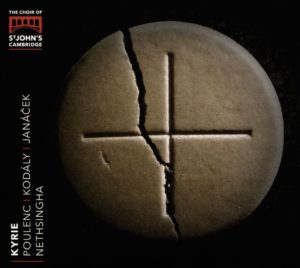After a productive but largely uninspired five-year stint with Chandos, the Choir of St. John’s College, Cambridge has gone it alone, and rediscovered its mojo in the process. Its most recent discs, released on the choir’s own imprint with Signum Classics, have achieved renewed appeal for their stylish packaging, imaginative repertoire selections, and some sharp recording that shows this ensemble, whose membership is updated annually, is on fine form. Kyrie, one of the latest discs, features three contrasting settings of liturgical texts. (Director Andrew Nethsingha makes a strong case for featuring them alongside one another in his insightful program notes.) The results make for rewarding and thought-provoking listening.
In the interest of full disclosure: I was a member of this choir in my student days, and I am a big fan of its hot-blooded “European” sound (in contrast with the flutier tone favored by many exponents of the English choral tradition). That said, as a self-professed John’s fanatic I feel especially confident in claiming that this disc has a good deal more going for it than many of the Chandos releases, a number of which I featured on. Of the pieces offered here, Poulenc’s Mass in G comes off worst. The choir’s ardent sound is a good match for the composer’s rough yet sensuous style, but close miking means that Poulenc’s tapestry of contrasting styles sounds disorderly, as if we are standing too close to a pointillist painting when a step back is required. For a more precise depiction of the Gloria’s bounding Benedictine monks playing football, or greater carillon clarity in the pealing Sanctus, George Guest’s more incisive, rhythmically vital 1994 recording of the same work is a better bet.
It is in Kodály’s Missa brevis that the choir really gets into its stride. This is a hulking symphonic setting (contrary to what the title suggests) written for voices and organ during the bloody 50-day siege of Budapest in 1944. The choir realizes the brooding score with unwavering intensity, and, most crucially, relays its imposing structure cleanly, made possible by Nethsingha’s sophisticated sense of phrasing, which sees the poignant Agnus Dei, for example, extend in broadly arching lines before slowly expiring.
In Janáček’s Otčenáš, a dreamy setting of the Lord’s Prayer for choir and harp, caressing delivery of the rocking opening movement makes this music enchant, while the ultimate cries of “Give us this day” have a thrilling demented quality. Choir member and tenor soloist Michael Bell sounds like he is working toward lirico-spinto opera roles. The trebles dig deep to invest this short but excellent work with dramatic clout.
































